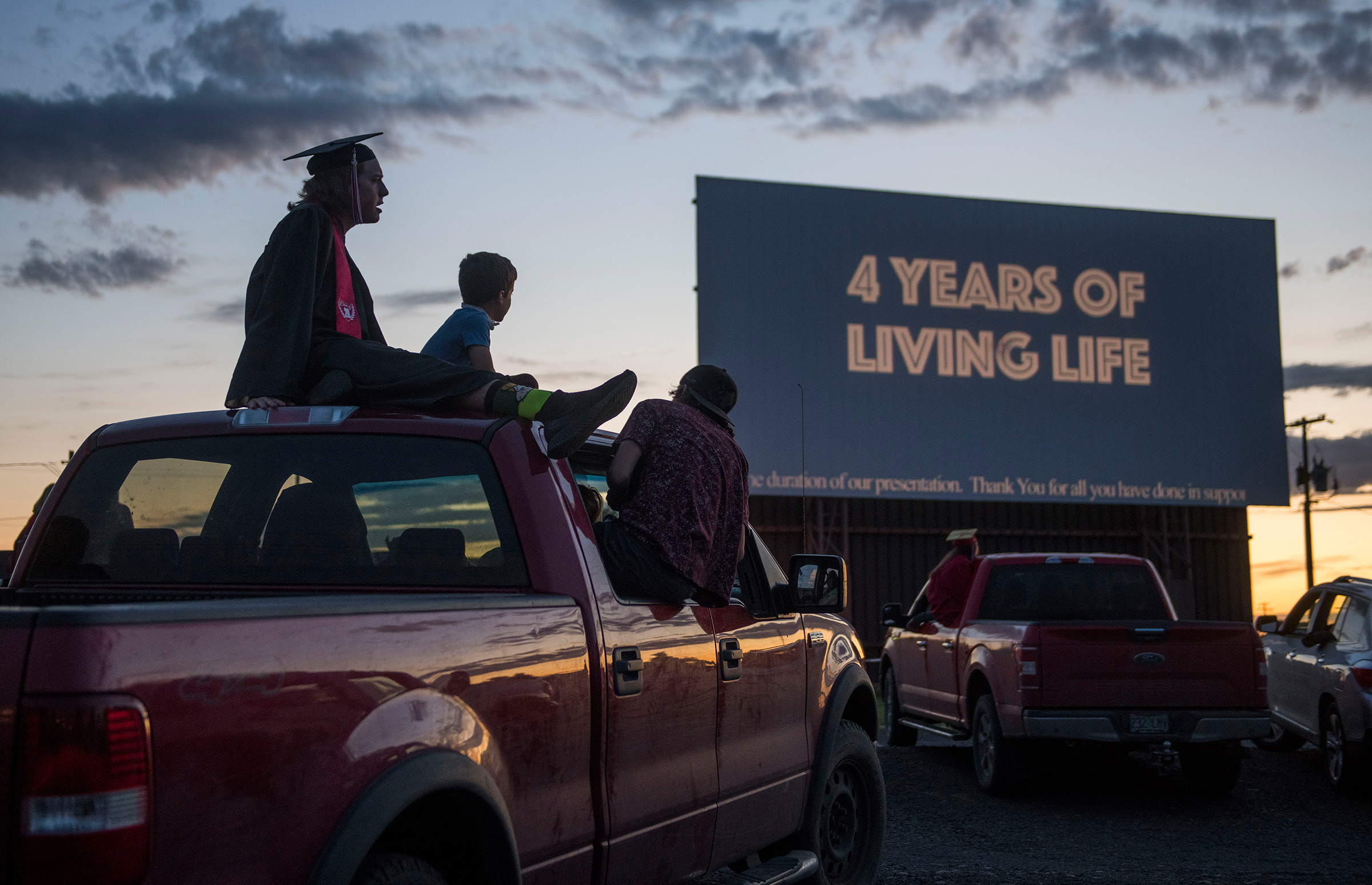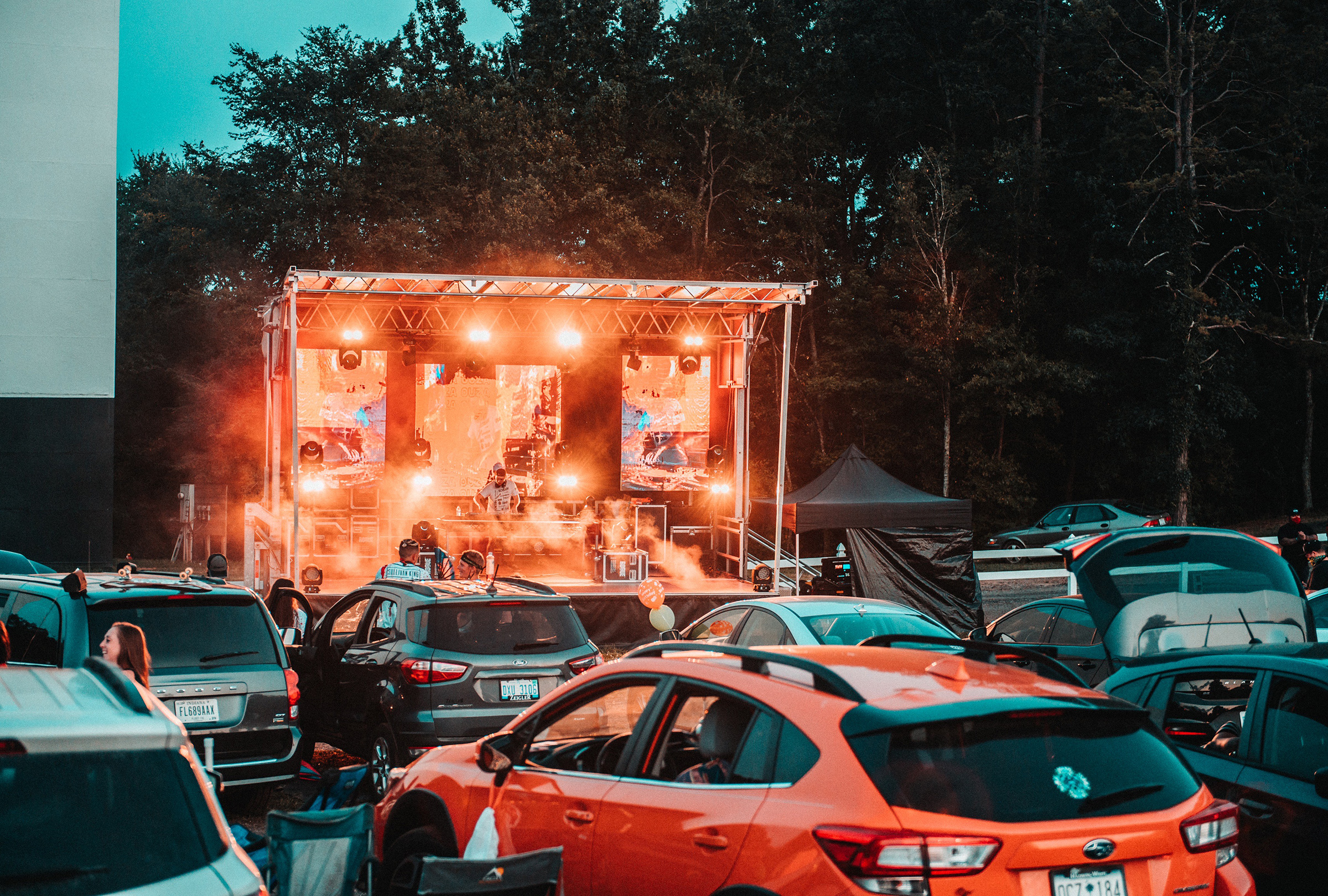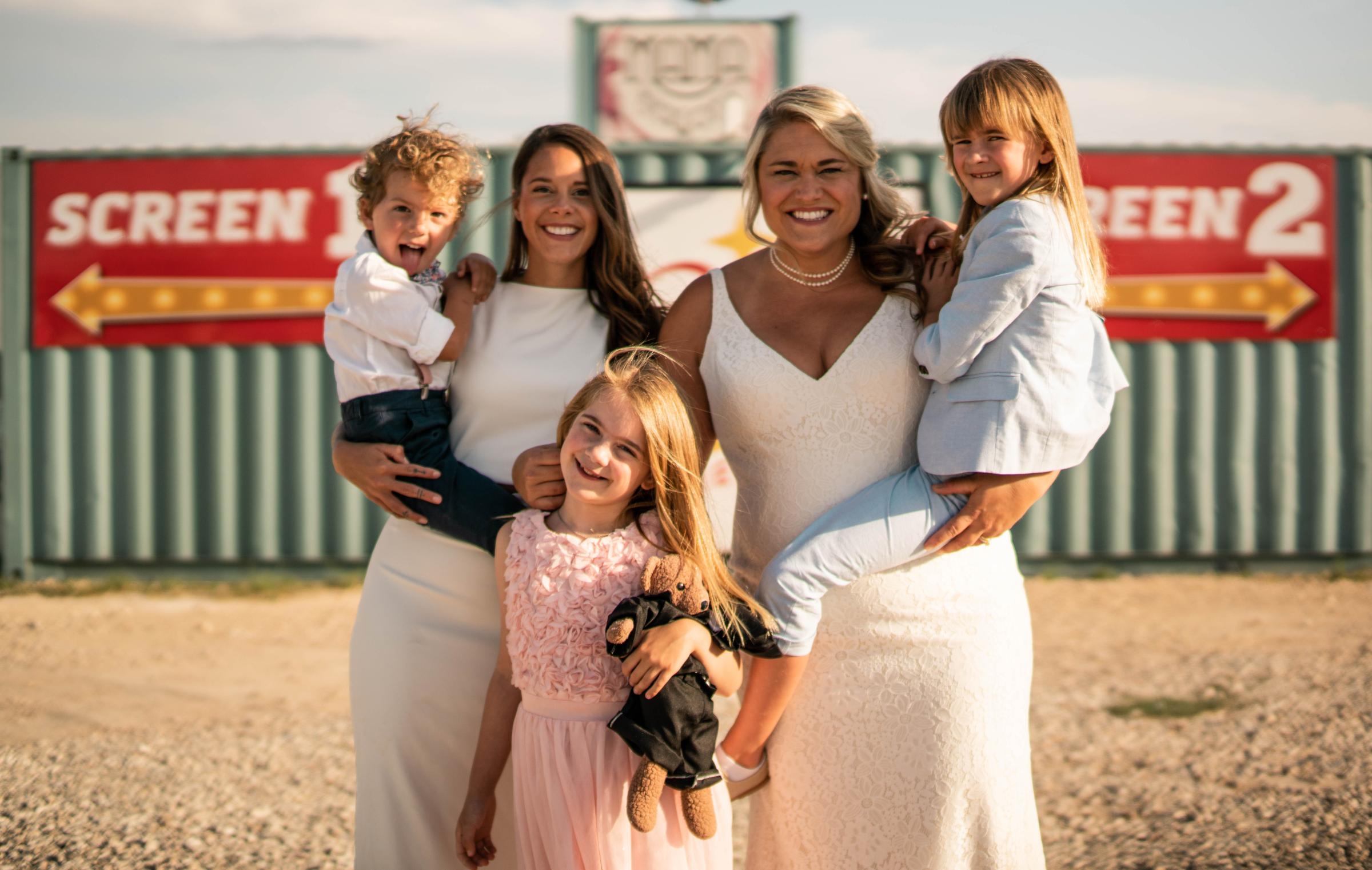
Bri and Lindsey Leaverton had their dream wedding all planned out. In April, they were going to get married at a century-old mansion in downtown Austin, with their guests sipping cocktails on a veranda by the pool.
Instead, they found themselves 20 miles south of town, tying the knot at a drive-in on a dirt road surrounded by cows. A formation of cars blasted their horns in delight. “When our wedding planner asked us about getting married at a drive-in, we looked at each other and said, ‘That sounds insane,'” Lindsey says.
The coronavirus has upended countless minor and major life events over the past few months. While many of these plans were canceled, a surprising share migrated to the drive-in movie theater, where social distancing, via cars and pickup trucks, is the norm. These theaters have scrambled to pivot their entire business model in the face of disappearing film releases–and have unwittingly become catchall communal hubs across the country. “Drive-ins are being contacted like they used to be, for everything in the community,” says filmmaker April Wright, who directed the documentary Going Attractions: The Definitive Story of the Movie Palace. “They’re hosting church services, weddings, graduations, dance recitals, concerts, stand-up comedy.”
Shifts to events like outdoor weddings and smaller-scale concerts serve as creative ways to stay afloat in an industry that was unforgiving before the pandemic: the number of drive-ins in the U.S. has continuously dwindled, especially as home and handheld entertainment command more and more attention. Now, increased costs, a delayed film slate and potential competition from pop-ups–the Tribeca Film Festival, for example, is programming drive-in experiences at beaches, sports stadiums and even Walmart parking lots–are making some theaters skeptical they can last through the crisis. “A lot of us are really struggling,” says Nathan McDonald, the owner of the 66 Drive-In in southwestern Missouri. “If [movies] continue to be pushed, I’ll probably close in late August.”

Some 300 independent drive-ins operate across the U.S. They typically make most of their money during the summer, when students are on break and blockbusters roll in every weekend. But this year’s tentpole films, from Mulan to Wonder Woman 1984, have been repeatedly delayed, thanks to the continued closure of major indoor-theater chains like AMC and Cinemark. As drive-ins opened for the season, they first turned to throwback classics like E.T. and Jaws, hoping to capitalize on nostalgia.
Such films have produced mixed results for theaters. At the 66 Drive-In, the average number of cars on a given night has dropped from 225 to 120. “You can easily sit from the comfort of your couch and watch these films,” McDonald says.
Instead of waiting for new blockbusters to salvage their businesses, many theater owners have taken advantage of other event-space closures. “We’re trying to substitute those new films for concerts or comedy shows so we can bring in relatively similar revenue,” says Joe Calabro, president of the Circle Drive-In near Scranton, Pa. The stream of a Garth Brooks show, aired at hundreds of drive-ins across the country, sold out. So the Circle turned to local musicians, whose normal gigs have been stripped away. Chris Shrive, a singer-songwriter from Old Forge, Pa., opened his band’s show from the concession-stand roof. “To overlook 450 cars; to see people barbecuing on the tailgates of their trucks, laughing, meeting people parked 18 ft. away–it was awe-inspiring,” Shrive says. “This just might be the new normal.”
Basking in the crowd was Sherry Sakosky, who was seeing her first live concert since the start of the pandemic. “There’s been a lot of built-up frustration and animosity,” says Sakosky, who estimates that some 95% of the concertgoers followed proper social-distancing protocols. “To be out amongst friends in a safe manner and to be able to experience the same show with them totally brings the community together.”
In Kings Mountain, N.C., the Hounds Drive-In has also thrived in its newfound role as a concert venue, especially because artists pay up front to use the space. “They set up everything, we get our money, we get to keep all the concessions,” owner Preston Brown says. “I love it.”
His financial success has enabled him to turn his drive-in into a sort of commons. The Hounds has hosted dance recitals and pet organizations; it’s welcomed more than a dozen graduating high school classes free of charge. Students received their diplomas on the big screen as their families watched from their cars. According to Scott Neisler, the mayor of Kings Mountain, the Hounds’ active presence has resulted in a local economic boost. He also staged the city’s Fourth of July fireworks show there, in order to celebrate the holiday safely.
But a storybook ending for drive-ins might prove elusive. Their new, outsize role in public life has not always ensured their financial health. The Bengies Drive-In Theatre, in Middle River, Md., has opened every day of some weeks, with concerts, church services and more. But the theater is operating at less than half capacity to promote social distancing, and has taken on a much bigger staff to control safety and crowding. “The public thinks we’re a cash cow,” says Bengies owner D. Edward Vogel. “But it’s been very hard on us.”
Pop-up theaters emerging since the start of the pandemic, says Vogel, are “breaking my heart.” He is particularly worried about the 160 temporary drive-ins arriving in Walmart parking lots–featuring films chosen by Tribeca Enterprises–in August. These spaces could further squeeze the independent operators. (A representative for Walmart did not respond to a request for comment.)
At the 66 Drive-In in Missouri, McDonald doubts he can make it to the fall, because of decreased capacity, a blank movie slate and people bringing their own food instead of buying from the concession stand. His financial plight is worrisome to David Fowler, pastor of the First United Methodist Church of Carthage, Mo., who has been holding services from the snack-bar roof every Sunday, to growing crowds. His congregation appreciates seeing fellow worshippers in person, as opposed to sitting at home alone. “It’s a bit of Americana I’d hate to see lost,” says Fowler.

In face of such hardships, drive-ins fight on for survival. In Buda, Texas, Doc’s Drive-In has housed graduations, soccer watch parties and two weddings, including the Leavertons’. In April, 45 cars rolled up on each side of a dirt-road aisle. The couple, who paid $4,000 to book Doc’s, swapped heels for boots and stood on a rickety stage, swatting away june bugs as an officiant married them from 6 ft. away. “It turned out the wedding we had was way, way better than anything we could have dreamed of,” Lindsey says. After the ceremony, Airplane! played on the big screen.
More Must-Reads from TIME
- Donald Trump Is TIME's 2024 Person of the Year
- Why We Chose Trump as Person of the Year
- Is Intermittent Fasting Good or Bad for You?
- The 100 Must-Read Books of 2024
- The 20 Best Christmas TV Episodes
- Column: If Optimism Feels Ridiculous Now, Try Hope
- The Future of Climate Action Is Trade Policy
- Merle Bombardieri Is Helping People Make the Baby Decision
Contact us at letters@time.com